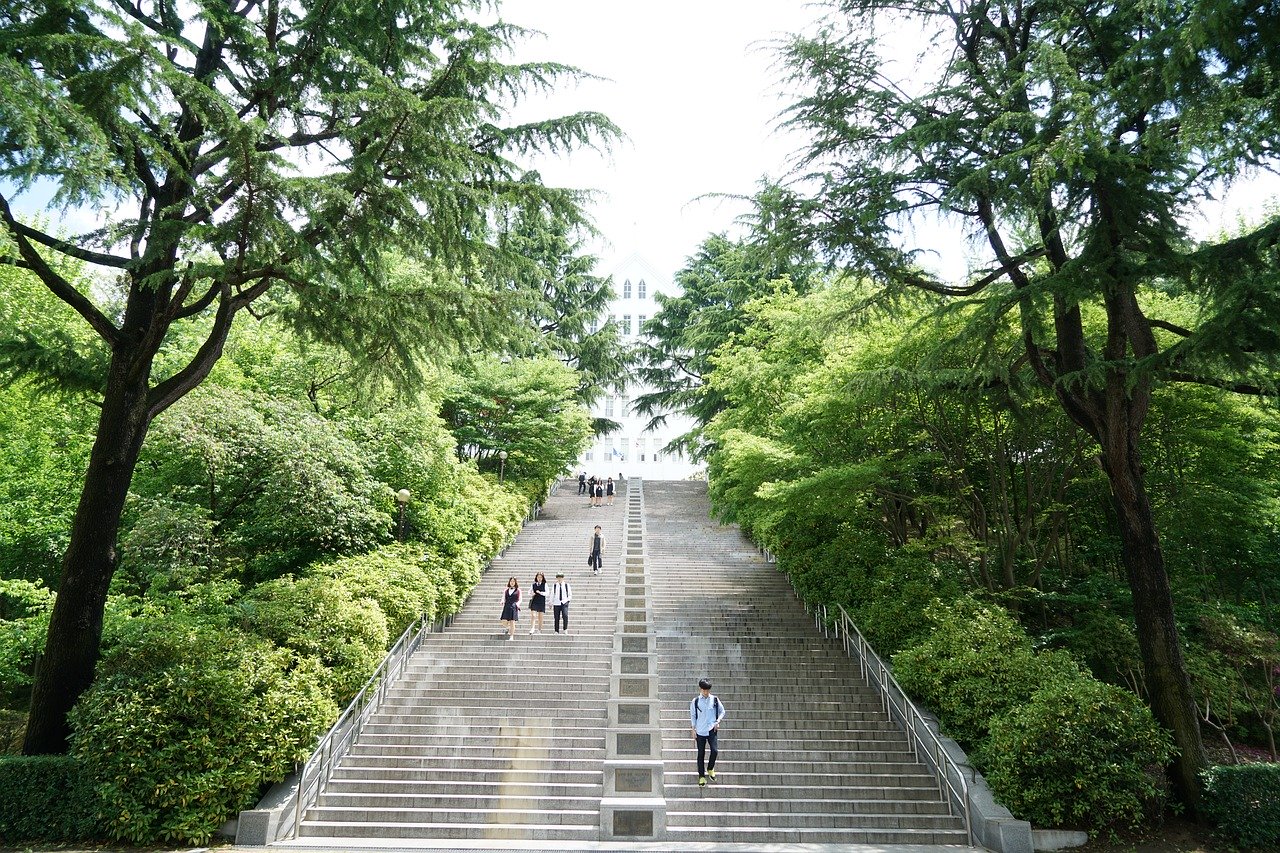Image by alstjd5805 from Pixabay
It’s September, which means that the school year has begun. In this post, let’s see some vocabulary and expressions that will help you talk about school in Korean.
학교는 어디로 가요? haggyo-neun eodi-lo gayo? Where do you go to school?
Lets start with some basic vocabulary.
- 학교
haggyo
school - 어느 학교에 다녀요?
eoneu haggyo-e danyeoyo?
What school do you go to? - 초등학교, 고등학교, 대학교
chodeunghaggyo, godeunghaggyo, daehaggyo
primary school, high school, university
- 학생, 선생님, 교수님
hagsaeng, seonsaengnim, gyosunim
student, teacher, professor - 그녀는 고등학생이에요.
geunyeo-neun godeunghagsaeng-ieyo.
She’s a high school student. - 그는 초등학교에 다녀요.
geu-neun chodeunghaggyoe danyeoyo.
He goes to primary school. - 몇 학년이에요?
myeot hagnyeon-ieyo?
What grade is he/she in? - 대학에서 무엇을 공부해요?
daehag-eseo mueos-eul gongbuhaeyo?
What are you studying at university?
교실에서 gyoshil-eseo In the classroom
Here’s some vocabulary to help you talk about the classroom.
- 교실, 학생 책상, 책장, 공책
gyoshil, hagsaeng chaegsang, chaegjang, gongchaeg
classroom, student’s desk, bookshelf, notebook - 선생님 책상, 칠판, 화이트 보드, 지도, 지구본
seonsaengnim chaegsang, chilpan, hwaiteu bodeu, jido, jigubon
teacher’s desk, blackboard, whiteboard, map, globe - 공책, 종이, 연필, 펜, 지우개
gongchaeg, jong-i, yeonpil, pen, jiugae
notebook, paper, pencil, pen, eraser - 테블릿, 화면, 계산기, 교과서
tebeullit, hwamyeon, gyesangi, gyogwaseo
tablet, screen, calculator, textbook - 공부하다, 배우다, 듣다, 시험보다, 주의하다, 필기하다
gongbuhada, baeuda, deudda, shiheomboda, juuihada, pilgihada
to study, to learn, to listen, to take a test, to pay attention, to take notes - 이 교실은 커요/작아요.
i gyoshil-eun keoyo/jag-ayo.
This classroom is big/small. - 선생님은 화이트보드에 글을 써요.
seonsaengnim-eun hwaiteubodeu-e geul-eul sseoyo.
The teacher writes on the whiteboard. - 학생들은 필기를 해요.
hagsaengdeul-eun pilgi-leul haeyo.
The students take notes. - 학생들은 선생님의 말씀을 들어요.
hagsaengdeul-eun seonsaengnim-ui malsseum-eul deuleoyo.
The students listen to the teacher. - 학생들은 선생님에게 주의를 기울인다.
hagsaengdeul-eun seonsaengnim-ege juui-leul giulinda.
The students pay attention to the teacher. - 질문이 있어요.
jilmun-i isseoyo.
I have a question. - 선생님은 학생들의 질문에 답해요.
seonsaengnim-eun hagsaengdeul-e jilmun-e dabhaeyo.
The teacher answers the students’ questions. - 선생님은 가르친다. 학생들은 배운다.
seonsaengnim-eun galeuchinda. hagsaengdeul-eun baeunda.
The teacher teaches. The students learn.
숙제 sugje homework
If you’re in primary school or high school, you probably have a lot of opportunity to say things like:
- 우리는 내일 시험이 있어요.
uli-neun naeil shiheom-i isseoyo.
We have a test tomorrow. - 시험을 보고 있어요.
shiheom-eul bogo isseoyo.
I’m taking a test. - 공부를 해야 해요.
gongbu-leul haeya haeyo.
I have to study. - 숙제가 많아요.
sugje-ga manayo.
I have a lot of homework. - 새로운 단어를 외워야 해요.
saeloun daneo-leul oewoya haeyo.
I have to memorize new vocabulary. - 매일 밤에 숙제를 해요.
maeil bam-e sugje-leul haeyo.
I do homework every night. - 시험에서 좋은/ 안좋은 점수를 받았어요.
shiheom-eseo joheun/ anjoheun jeomsu-leul badasseoyo.
I got a good/bad grade on the test. - 그 수업에 합격/ 불합격 했다.
geu sueob-e habgyeog/ bulhabgyeog haetda.
I passed/failed the class.
학교 과목 haggyo gwamog school subjects
Here are some common school subjects in Korean.
- 건축학
geonjughag
architecture - 미술
misul
art - 생물학
saengmulhag
biology - 화학
hwahag
chemistry - 컴퓨터공학
keompyuteogonghak
computer science - 경제
gyeongje
economics - 공학
gonghag
engineering - 지질학
jijilhag
geology - 역사
yeojsa
history - 언어
eoneo
languages - 법학
beopak
law - 언어학
eoneohag
linguistics - 문학
munhag
literature - 수학
suhag
math - 의학
uihag
medicine - 음악
eumag
music - 철학
cheolhag
philosophy - 체육
cheyug
physical education - 물리학
mullihag
physics - 행정학
haengjonghag
political science - 심리학
shimlihag
psychology - 과학
gwahag
science - 사회학
sahoehag
sociology
좋아하는 과목이 뭐예요? johahaneun gwamog-i mwoyeyo? What’s your favorite subject?
Here’s some vocabulary for talking about the subjects you like, and the ones you don’t.
- 역사는 내가 가장 좋아하는 과목이에요.
yeogsa-neun naega gajang johahaneun gwamog-ieyo.
History is my favorite subject. - 언어를 잘해요.
eoneo-leul jalhaeyo.
I’m good at languages. - 생물학을 잘 해요.
saengmulhag-eul jal haeyo.
I’m doing well in biology. - 생물학에서 좋은 점수를 받고 있어요.
saengmulhag-eseo joheun jeomsu-leul badgo isseoyo.
I’m getting good grades in biology. - 싫어하는 과목이 뭐예요?
shilheoha-neun gwamog-i mwoyeyo?
What’s your least favorite subject? - 수학을 좋아하지 않아요.
suhag-eul johahaji anayo.
I don’t like math. - 과학을 못해요.
gwahag-eul mot haeyo.
I’m bad at science. - 화학을 이해 못해요.
hwahag-eul ihae mot haeyo.
I can’t understand chemistry. - 물리학을 잘하지 못해요.
mullihag-eul jalhaji mot haeyo.
I’m doing poorly in physics. - 물리학에서 안좋은 점수를 받고 있어요.
mullihag-eseo anjoheun jeomsu-leul badgo isseoyo.
I’m getting bad grades in physics.
대학교에서 daehaggyo-eseo at university
If you’re a 대학생 daehagsaeng university student, you’ll probably have a chance to use this vocabulary.
- 강의, 세미나
gang-ui, semina
lecture, seminar - 강당, 강의실, 실험실
gangdang, ganguishil, shilheomshil
auditorium, lecture hall, laboratory - 전공이 뭐예요?
jeongong-i mwoyeyo?
What’s your major? - 오늘 수업이 있어요.
oneul sueob-i isseoyo.
I have class today. - 오늘 오후에 수업이 없어요.
oneul ohu-e sueob-i eobseoyo.
I don’t have class this afternoon. - 도서관에서 공부해요.
doseogwan-eseo gongbuhaeyo.
I study in the library. - 조사하고 있어요.
josahago isseoyo.
I’m doing research. - 연구 논문을 쓰고 있어요.
yeongu nonmun-eul sseugo isseoyo.
I’m writing a research paper. - 실험을 하고 있어요.
shilheom-eul hago isseoyo.
I’m doing an experiment. - 논문은 무엇에 관한 거에요?
nonmun-eun mueos-e gwanhan geoeyo?
What’s your thesis on? - 논문을 쓰고 있어요.
nonmun-eul sseugo isseoyo.
I’m writing my thesis. - 기숙사에서 살아요.
gisugsa-eseo salayo.
I live in a dormitory. - 룸메이트가 있어요.
lummeiteu-ga isseoyo.
I have a roommate.
Learn Korean with the Language Garage
Check out our other posts on Korean language, culture, and more. And if you’re looking for convenient and affordable live Korean lessons with a real teacher, check out The Language Garage. Our lessons are given online in a virtual classroom, so it doesn’t matter where you live or work – we can come to you. And we have flexible options, with a free trial so that you can decide if there’s a fit. Check us out!





